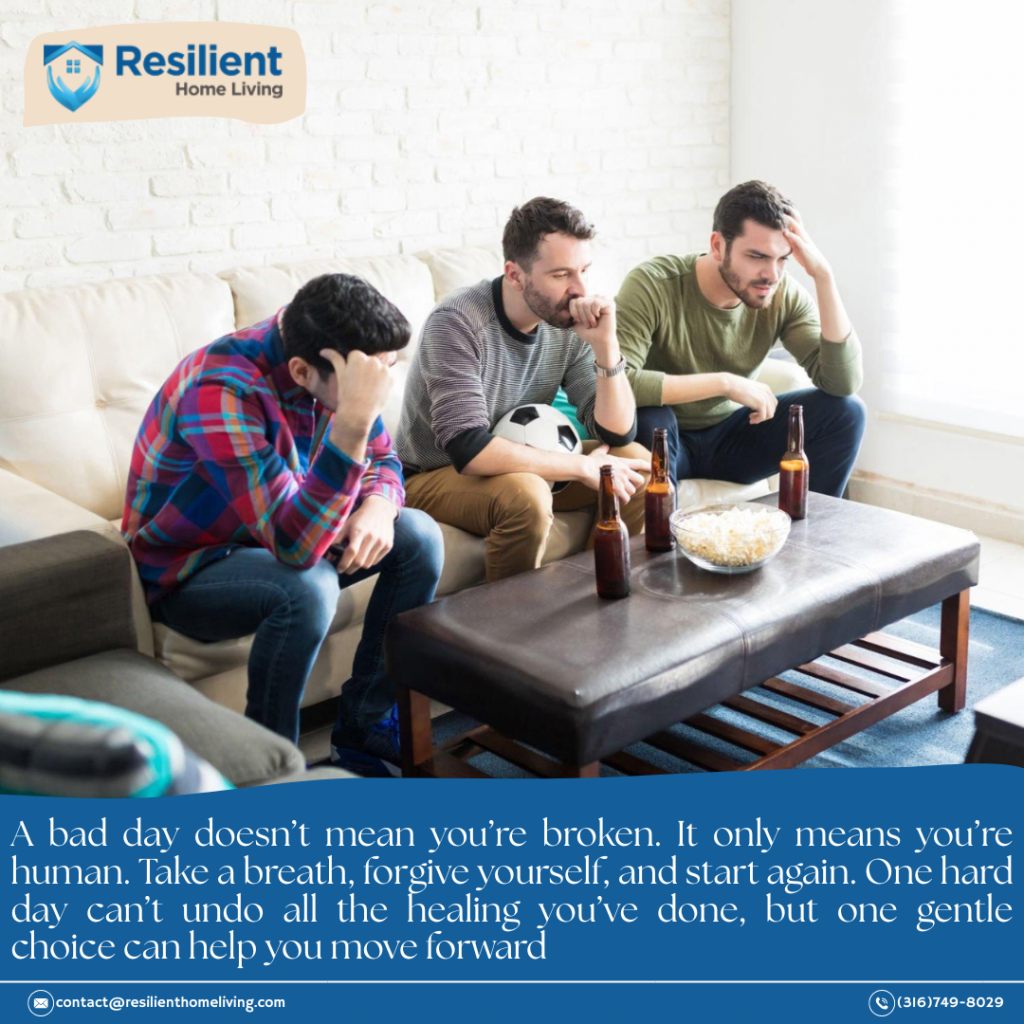No matter how strong your recovery, how positive your mindset, or how good your intentions — bad days happen.
You wake up tired, something triggers you, a plan falls apart, or emotions hit harder than expected. Suddenly, you feel like you’ve lost control or slipped backward.
Here’s the truth:
A bad day doesn’t mean a bad life.
It doesn’t erase your growth, and it certainly doesn’t define your recovery.
Everyone struggles. The difference is in how you respond — how you choose to reset, refocus, and remind yourself that one difficult day doesn’t undo all your healing.
Let’s walk through how to bounce back with grace, patience, and strength.
Accept That Bad Days Are Part of Life
You can’t heal by pretending every day feels perfect.
Bad days are normal — even necessary. They remind us we’re human.
Instead of asking, “Why am I like this again?” try asking, “What can I learn from this moment?”
Acceptance takes away shame. It turns “I’m failing” into “I’m feeling.”
And feelings — even painful ones — pass.
Don’t Judge the Day — Or Yourself
The worst part of a bad day is often not the event itself, but how we talk to ourselves afterward.
We say things like:
- “I should be stronger by now.”
- “I messed everything up.”
- “What’s wrong with me?”
None of that helps you heal.
Practice gentle self-talk instead:
“This day was hard, but I’m still learning.”
“I’m allowed to struggle — that’s part of recovery.”
Beating yourself up doesn’t fix anything. Compassion does.
Pause Before Reacting
Bad days can make you want to escape, lash out, isolate, or return to old habits.
Before reacting, pause.
Take a few deep breaths.
Go outside.
Drink some water.
Do anything that gives your brain space before your emotions take over.
That pause is power — it’s the space between impulse and intention.
Identify the Trigger
Ask yourself: What made today so hard?
Was it stress, a memory, a comment, or just exhaustion?
Knowing the cause helps you respond more wisely next time.
Sometimes, it’s not even one big thing — it’s ten small ones stacked together. That’s okay too. Awareness turns chaos into clarity.
Ground Yourself in the Present Moment
When your mind spirals, bring yourself back to now.
Try:
- 5–4–3–2–1 grounding (name 5 things you see, 4 you feel, 3 you hear, 2 you smell, 1 you taste)
- Breathing exercises
- Journaling what’s actually happening, not what your thoughts predict
You can’t control yesterday or tomorrow — but you can choose this moment.
Reach Out Instead of Shutting Down
Isolation feeds negative thoughts.
Even if it’s just one text — reach out.
Call your sponsor, a friend, or someone from your recovery group.
Say, “Hey, today’s been rough. Can we talk?”
You don’t need solutions — just connection. People can’t support what they don’t know about.
You’re not a burden. You’re a human being asking for support — and that’s strength, not weakness.
Move Your Body
Movement helps release tension, even when motivation is low.
Take a walk, stretch, clean your space, or do something active.
Exercise releases endorphins, boosts energy, and helps your body process emotions faster than overthinking ever could.
You don’t have to “work out” — just move.
Revisit a Calming Routine
What usually grounds you when life feels too loud?
Maybe it’s:
- Meditation
- Journaling
- Music
- A hot shower
- Watching something comforting
- Breathing with intention
Lean into that. Routines are anchors — they remind you of stability when everything feels unstable.
Focus on What’s Still Going Right
Even in a bad day, something is still okay.
You’re still sober. You still have support. You’re still trying. That matters.
Try a quick gratitude reset:
🪶 List three things that didn’t go wrong today.
It helps you see the day as layered — not purely “bad,” just hard.
Reset Your Environment
Sometimes your surroundings hold onto stress.
Open a window, change the lighting, clean a small area, or step outside.
A small environmental shift can make a big emotional difference.
You’re not escaping — you’re resetting your atmosphere to support your mood.
Reframe the Story
A bad day can make you forget how far you’ve come.
Reframe it:
“This is one hard day in a long line of healing.”
“Today tested me, but it didn’t defeat me.”
You’re not back at square one — you’re gaining resilience.
Recovery isn’t about avoiding pain; it’s about handling it differently.
End the Day Gently
You don’t have to fix the whole day before bed.
Just do one small thing that helps you end it softly:
- Write one sentence in your journal.
- Take a shower.
- Say a prayer.
- Breathe deeply.
- Forgive yourself.
Then, let the day go.
Tomorrow is already waiting to give you another chance.
Final Thought
Everyone has bad days — even in recovery.
But you’ve already proven that you can survive difficult things.
So when the day feels heavy, remind yourself:
You’ve handled worse. You’re still here. You’re still healing.
Bouncing back doesn’t mean pretending the bad day never happened — it means giving yourself permission to begin again.
And that’s what real resilience looks like.

